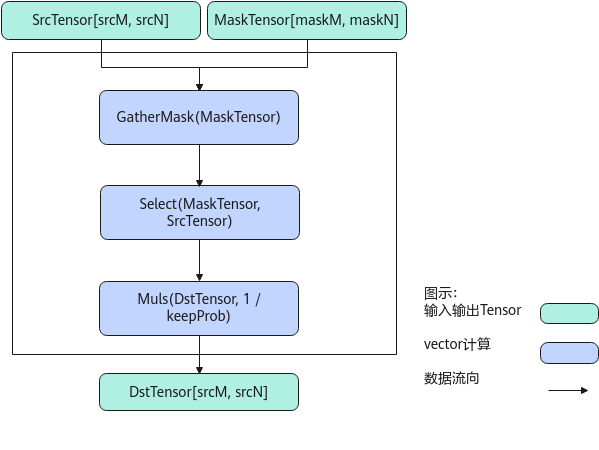DropOut
函数功能
提供根据MaskTensor对SrcTensor(源操作数,输入Tensor)进行过滤的功能,得到DstTensor(目的操作数、输出Tensor)。仅支持输入shape为ND格式。
该过滤功能包括两种模式,字节模式和比特模式。
- 字节模式
MaskTensor中存储的数值为布尔类型,每个布尔数值代表是否取用SrcTensor对应位置的数值:如果是,则选取SrcTensor中的数值存入DstTensor;否则,对DstTensor中的对应位置赋值为零。DstTensor,SrcTensor和MaskTensor的shape相同。示例如下:
SrcTensor=[1,2,3,4,5,6,7,8,9,10]
MaskTensor=[1,0,1,0,1,0,0,1,1,0](每个数的数据类型为uint8_t)
DstTensor=[1,0,3,0,5,0,0,8,9,0]
- 比特模式
MaskTensor的每个bit数值,代表是否取用SrcTensor对应位置的数值:如果是,则选取SrcTensor中的数值存入DstTensor;否则,对DstTensor中的对应位置赋值为零。SrcTensor和DstTensor的shape相同,假设均为[height , width],MaskTensor的shape为[height , (width / 8)]。示例如下:
SrcTensor=[1,2,3,4,5,6,7,8]
MaskTensor=[169](转换为二进制表示为1010 1001)
DstTensor=[1,0,3,0,5,0,0,8]
- 特殊情况1:当MaskTensor有效数据非连续存放时,MaskTensor的width轴,为了满足32B对齐,需要填充无效数值,SrcTensor的width轴,需满足32Byte对齐。示例如下:
SrcTensor=[1,2,3,4,5,6,7,8,11,12,13,14,15,16,17,18]
MaskTensor=[1,0,1,0,1,0,0,1,X,X,1,0,1,0,1,0,0,1,X,X](X为无效数值,假设数据已满足对齐要求,示例数值为二进制形式表示)
DstTensor=[1,0,3,0,5,0,0,8,11,0, 13, 0, 15, 0, 0,18]
- 特殊情况2:当MaskTensor有效数据连续存放,maskTensor_size不满足32B对齐时,需要在MaskTensor的尾部补齐32B对齐时,对应SrcTensor的尾部也需要补充无效数据,使得srcTensor_size满足32B对齐。示例如下:
SrcTensor=[1,2,3,4,5,6,7,8,11,12,13,14,15,16,17,18]
MaskTensor=[1,0,1,0,1,0,0,1, 1, 0, 1, 0, 1, 0, 0, 1,X,X,X,X](X为无效数值,假设数据已满足对齐要求,示例数值为二进制形式表示)
DstTensor= [1,0,3,0,5,0,0,8, 11, 0, 13, 0, 15, 0, 0, 18]
- 特殊情况1:当MaskTensor有效数据非连续存放时,MaskTensor的width轴,为了满足32B对齐,需要填充无效数值,SrcTensor的width轴,需满足32Byte对齐。示例如下:
实现原理
以float类型,ND格式,shape为[srcM, srcN]的SrcTensor,shape为[maskM, maskN]的MaskTensor,比特模式场景为例,描述Dropout高阶API内部算法框图,如下图所示。

计算过程分为如下几步,均在Vector上进行:
- GatherMask步骤:对输入的MaskTensor做脏数据清理,使得MaskTensor中只保留有效数据;
- Select步骤:根据输入的MaskTensor对SrcTensor做数据选择,被选中的数据位置,保留原始数据,对舍弃的数据位置,设置为0;
- Muls步骤:将输出数据每个元素除以keepProb。
函数原型
1 2 |
template <typename T, bool isInitBitMode = false, uint32_t dropOutMode = 0> __aicore__ inline void DropOut(const LocalTensor<T>& dstLocal, const LocalTensor<T>& srcLocal, const LocalTensor<uint8_t>& maskLocal, const float keepProb, const DropOutShapeInfo& info) |
1 2 |
template <typename T, bool isInitBitMode = false, uint32_t dropOutMode = 0> __aicore__ inline void DropOut(const LocalTensor<T>& dstLocal, const LocalTensor<T>& srcLocal, const LocalTensor<uint8_t>& maskLocal, const LocalTensor<uint8_t>& sharedTmpBuffer, const float keepProb, const DropOutShapeInfo& info) |
参数说明
参数名 |
描述 |
|---|---|
T |
操作数的数据类型。 |
isInitBitMode |
在比特模式下,是否需要在接口内部初始化(默认false)。 |
dropOutMode |
选择执行何种输入场景: 0:默认值,由接口根据输入shape推断运行模式,注意,推断不符合预期的场景,需设置对应模式 1:执行字节模式,且maskLocal含有脏数据 2:执行字节模式,且maskLocal不含有脏数据 3:执行比特模式,且maskLocal不含有脏数据 4:执行比特模式,且maskLocal含有脏数据 |
参数名称 |
输入/输出 |
含义 |
||
|---|---|---|---|---|
dstLocal |
输出 |
目的操作数。 类型为LocalTensor,支持的TPosition为VECIN/VECCALC/VECOUT。
|
||
srcLocal |
输入 |
源操作数。 类型为LocalTensor,支持的TPosition为VECIN/VECCALC/VECOUT。 srcLocal的数据类型需要与目的操作数保持一致。
|
||
maskLocal |
输入 |
存放mask的Tensor。 类型为LocalTensor,支持的TPosition为VECIN/VECCALC/VECOUT。
|
||
sharedTmpBuffer |
输入 |
共享缓冲区,用于存放API内部计算产生的临时数据。该方式开发者可以自行管理sharedTmpBuffer内存空间,并在接口调用完成后,复用该部分内存。Tensor的大小应符合对应tiling的要求,配合tiling一起使用。 类型为LocalTensor,支持的TPosition为VECIN/VECCALC/VECOUT。
|
||
keepProb |
输入 |
权重系数,srcLocal中数据被保留的概率,过滤后的结果会除以权重系数,存放至dstLocal中。 keepProb∈(0,1)
|
||
info |
输入 |
DropOutShapeInfo类型,DropOutShapeInfo结构定义如下:
|
返回值
无
支持的型号
约束说明
- srcTensor和dstTensor的Tensor空间可以复用。
- srcLocal和dstLocal地址对齐要求请见 :通用约束。
- 仅支持输入shape为ND格式。
- maskLocal含有脏数据的场景,要求info.maskLastAxis中有效数值的个数,应为2的整数倍。
- maskLocal含有脏数据的场景,maskLocal中的数据可能会被修改,脏数据可能会被舍弃。
调用示例
1 2 3 4 5 6 7 8 9 10 11 12 13 14 15 16 17 18 19 20 21 22 23 24 25 26 27 28 29 30 31 32 33 34 35 36 37 38 39 40 41 42 43 44 45 46 47 48 49 50 51 52 53 54 55 56 57 58 59 60 61 62 63 64 65 66 67 68 69 70 71 72 73 74 75 76 77 78 79 80 81 82 83 84 85 86 87 88 89 90 91 92 93 94 95 96 |
#include "kernel_operator.h" template <typename srcType> class KernelDropout { public: __aicore__ inline KernelDropout() {} __aicore__ inline void Init(GM_ADDR srcGm, GM_ADDR maskGm, GM_ADDR dstGm, uint32_t firstAxis, uint32_t srcLastAxis, uint32_t maskLastAxis, uint32_t tmpBufferSize) { srcSize = firstAxis * srcLastAxis; maskSize = firstAxis * maskLastAxis; info.firstAxis = firstAxis; info.srcLastAxis = srcLastAxis; info.maskLastAxis = maskLastAxis; srcGlobal.SetGlobalBuffer(reinterpret_cast<__gm__ srcType *>(srcGm), srcSize); maskGlobal.SetGlobalBuffer(reinterpret_cast<__gm__ uint8_t *>(maskGm), maskSize); dstGlobal.SetGlobalBuffer(reinterpret_cast<__gm__ srcType *>(dstGm), srcSize); pipe.InitBuffer(inQueueX, 1, srcSize * sizeof(srcType)); pipe.InitBuffer(inQueueY, 1, maskSize * sizeof(uint8_t)); pipe.InitBuffer(outQueue, 1, srcSize * sizeof(srcType)); pipe.InitBuffer(tmpQueue, 1, tmpBufferSize); } __aicore__ inline void Process() { CopyIn(); Compute(); CopyOut(); } private: __aicore__ inline void CopyIn() { AscendC::LocalTensor<srcType> srcLocal = inQueueX.AllocTensor<srcType>(); AscendC::LocalTensor<uint8_t> maskLocal = inQueueY.AllocTensor<uint8_t>(); AscendC::DataCopy(srcLocal, srcGlobal, srcSize); AscendC::DataCopy(maskLocal, maskGlobal, maskSize); inQueueX.EnQue(srcLocal); inQueueY.EnQue(maskLocal); } __aicore__ inline void Compute() { AscendC::LocalTensor<srcType> dstLocal = outQueue.AllocTensor<srcType>(); AscendC::LocalTensor<uint8_t> sharedTmpBuffer = tmpQueue.AllocTensor<uint8_t>(); AscendC::LocalTensor<srcType> srcLocal = inQueueX.DeQue<srcType>(); AscendC::LocalTensor<uint8_t> maskLocal = inQueueY.DeQue<uint8_t>(); AscendC::DropOut(dstLocal, srcLocal, maskLocal, sharedTmpBuffer, probValue, info); outQueue.EnQue<srcType>(dstLocal); inQueueX.FreeTensor(srcLocal); inQueueY.FreeTensor(maskLocal); tmpQueue.FreeTensor(sharedTmpBuffer); } __aicore__ inline void CopyOut() { AscendC::LocalTensor<srcType> dstLocal = outQueue.DeQue<srcType>(); AscendC::DataCopy(dstGlobal, dstLocal, srcSize); outQueue.FreeTensor(dstLocal); } private: AscendC::GlobalTensor<srcType> srcGlobal; AscendC::GlobalTensor<uint8_t> maskGlobal; AscendC::GlobalTensor<srcType> dstGlobal; AscendC::TPipe pipe; AscendC::TQue<AscendC::QuePosition::VECIN, 1> inQueueX; AscendC::TQue<AscendC::QuePosition::VECIN, 1> inQueueY; AscendC::TQue<AscendC::QuePosition::VECOUT, 1> outQueue; AscendC::TQue<AscendC::QuePosition::VECCALC, 1> tmpQueue; uint32_t srcSize = 0; uint32_t maskSize = 0; float probValue = 0.8; AscendC::DropOutShapeInfo info; }; extern "C" __global__ __aicore__ void kernel_dropout_operator( GM_ADDR srcGm, GM_ADDR maskGm, GM_ADDR dstGm, GM_ADDR tiling) { GET_TILING_DATA(tilingData, tiling); KernelDropout<half> op; op.Init(srcGm, maskGm, dstGm, tilingData.firstAxis, tilingData.srcLastAxis, tilingData.maskLastAxis, tilingData.tmpBufferSize); op.Process(); } |